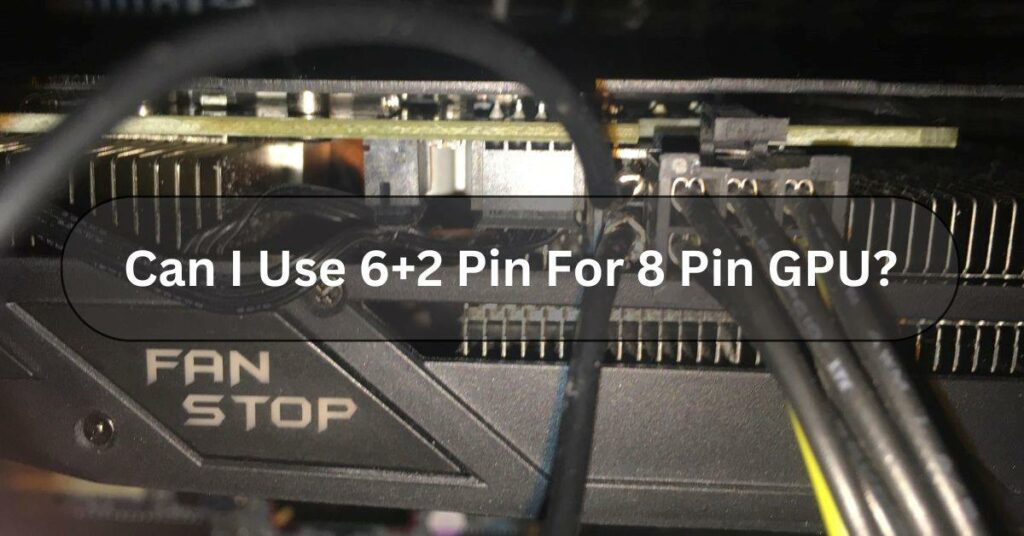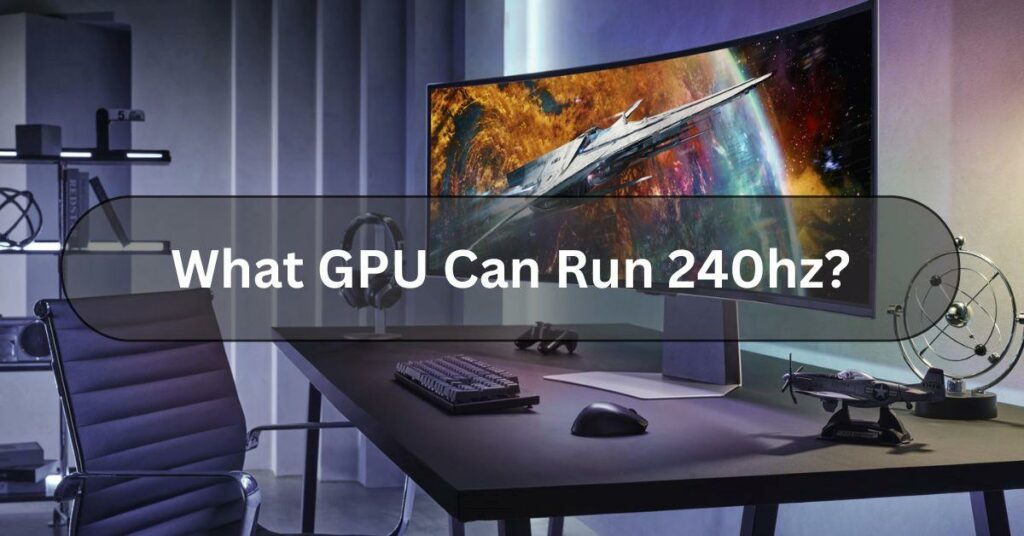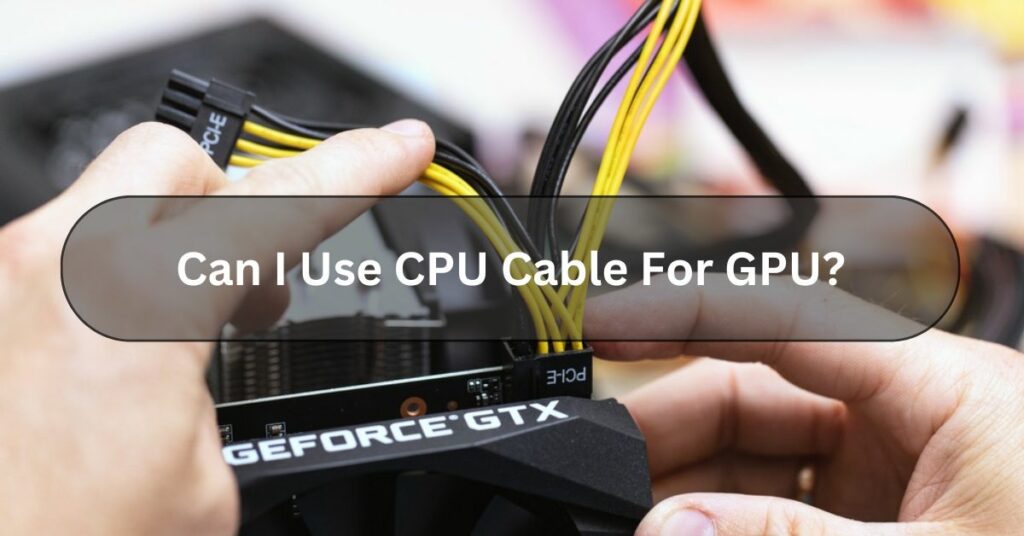Have you ever wondered why your computer is not performing as well as it should? Sometimes, The problem lies in how your CPU and GPU work together. This is where a CPU GPU Bottleneck Calculator can help.
A CPU GPU Bottleneck Calculator helps gamers identify whether their CPU or GPU is causing performance issues, allowing them to make informed upgrades for optimal performance.
In this article, I will share my personal experience with using this handy tool to improve my computer’s performance. Whether you are a gamer, a video editor, or just someone who wants their PC to run smoothly, understanding and fixing bottlenecks can make a big difference. Let us dive in:
Understanding Bottlenecks – Discover Solutions!
What Is A Bottleneck?
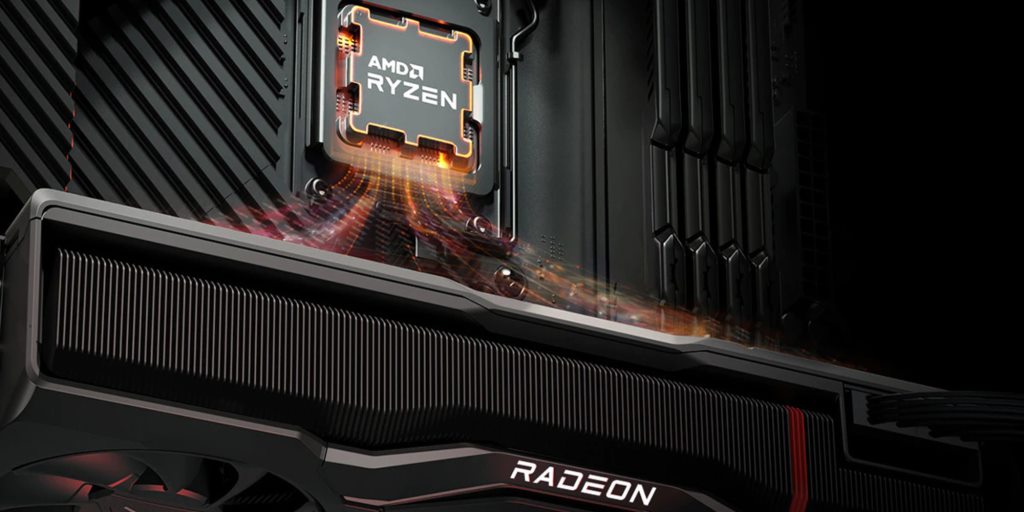
In computing, a bottleneck happens when one part of the system slows down the whole thing. For example, if the CPU is too slow for the GPU or the other way around, the system will not perform as well as it could.
Why Bottlenecks Matter?
Finding and fixing slow spots in your computer is important for gamers and professionals who need top performance. By figuring out which part is causing the slowdown, you can upgrade just that part and avoid spending extra money.
What Is A CPU GPU Bottleneck? – Let Us Explore!
A CPU-GPU bottleneck happens when either the CPU or the GPU is much slower than the other part of your computer. This causes the faster part to wait for the slower part, slowing down the overall performance of your system.
For example, if your CPU is too slow, it can not keep up with your fast GPU, causing lag in games or applications. Similarly, if your GPU is slow compared to your CPU, it can not render graphics fast enough, leading to delays and poor performance. Balancing the speed of both is crucial for smooth computing.
Read Also: What Happens If GPU Is Not Seated Properly?
How Does The CPU GPU Bottleneck Calculator Work?
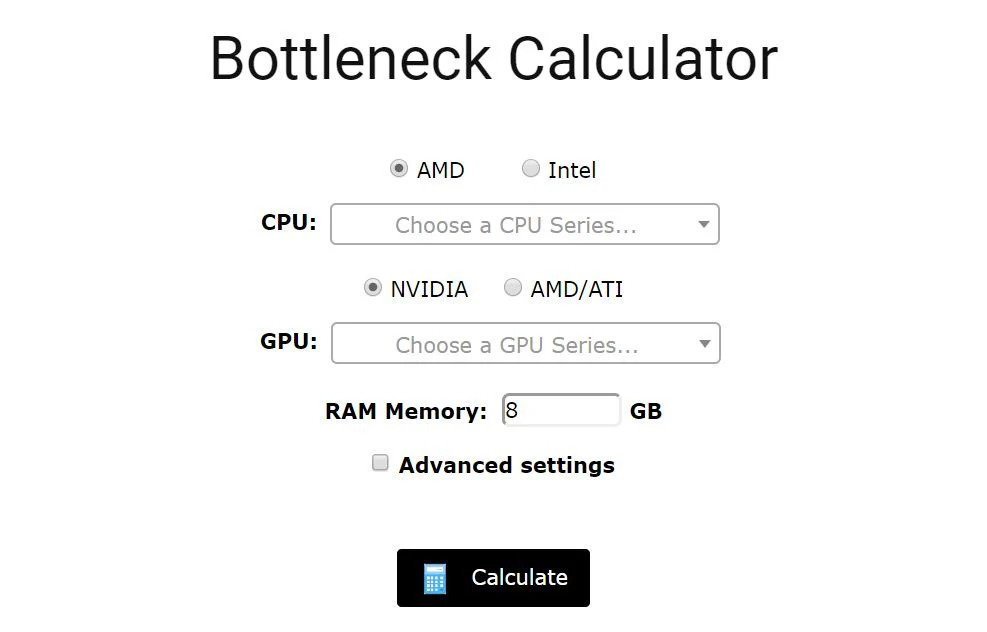
Step-By-Step Guide:
A CPU-GPU bottleneck calculator helps determine if the CPU or the GPU limits your computer’s performance.
Here Is How It Works:
- Data Collection: You input details about your CPU and GPU, like their model and speed.
- Performance Analysis: The calculator compares your CPU and GPU specs with a large database of other people’s results.
- Bottleneck Detection: It checks which part of your system is slower. If the CPU is slower, it might be causing a “bottleneck,” meaning it can not keep up with the GPU. If the GPU is slower, it is the opposite.
- Recommendation: The tool then tells you if you need a better CPU or GPU or if your system is well-balanced.
Benefits Of Using The Calculator:
- Accurate Diagnostics: Provides precise insights into your system’s performance.
- Cost-Effective Upgrades: Helps you invest in the right component.
- Enhanced Gaming Experience: Reduces lag and improves frame rates.
Causes Of CPU And GPU Bottlenecks – Discover The Causes!
The most common signs of trouble are games running slowly, freezing, and lagging. Even if your graphics card can run a game at 60 frames per second (FPS) or more, that is all you will get if your CPU can only handle 30 FPS. In this case, you would need more than upgrading your graphics card.
CPU Overload:
Your computer’s processor is not fast enough to keep up with your graphics card, causing the game to stutter and have low frame rates. Upgrading your processor will make everything run more smoothly.
GPU Overload:
Your graphics card can not handle the graphics, causing problems. You need to upgrade your graphics card for better performance.
Mismatched Components:
A weak CPU and a strong GPU, or the other way around, can slow down your computer. Try to get a CPU and GPU that work well together for the best performance.
Read Also: How To Control GPU Fan Speed?
Identifying The Bottlenecked System – The Key Signs!
When your CPU and GPU are not balanced correctly, you might notice a few signs of bottlenecking.

Choppy Frame Rates:
A bottlenecked system often causes choppy, uneven frame rates in games and apps. Either your CPU or GPU can not process information fast enough, leading to stuttering, lagging, and dropped frames.
High CPU Usage:
If your CPU usage frequently hits 90-100% during graphics-heavy tasks while your GPU usage remains low, your CPU is likely causing the bottleneck. It can not send data fast enough to the GPU, which is not fully utilized.
Low GPU Usage:
On the other hand, if your GPU usage is low but your CPU usage is high, your graphics card is the bottleneck. Your CPU can handle tasks well, but the GPU struggles to keep up with rendering demands.
Long Load Times:
Bottlenecked systems often experience long load times in games and graphics-heavy apps. This delay happens because loading assets from storage into memory takes more time than processing them with the CPU/GPU.
Calculating Cpu Gpu Bottlenecks – Calculate Now!
To find out if your CPU is causing a bottleneck, use a monitoring tool like MSI Afterburner while playing games.
Here Is How You Can Check:
CPU Usage:
Watch if your CPU usage stays at 100% while your GPU usage is lower. If so, your CPU might be slowing down your GPU’s performance.
GPU Usage:
If your GPU usage hits 100% but your CPU usage remains lower, your GPU could be the limiting factor.
Frame Rates:
If your game runs slowly even though CPU and GPU usage are high, you might need to upgrade your processor and graphics card for better performance.
Resolution And Graphics Settings:
If you are playing at a high resolution with maximum graphics settings and getting poor performance, try lowering the resolution and graphics quality. If your frame rates significantly improve, your hardware might struggle at higher settings.
Understanding CPU GPU Bottleneck Calculator Results:
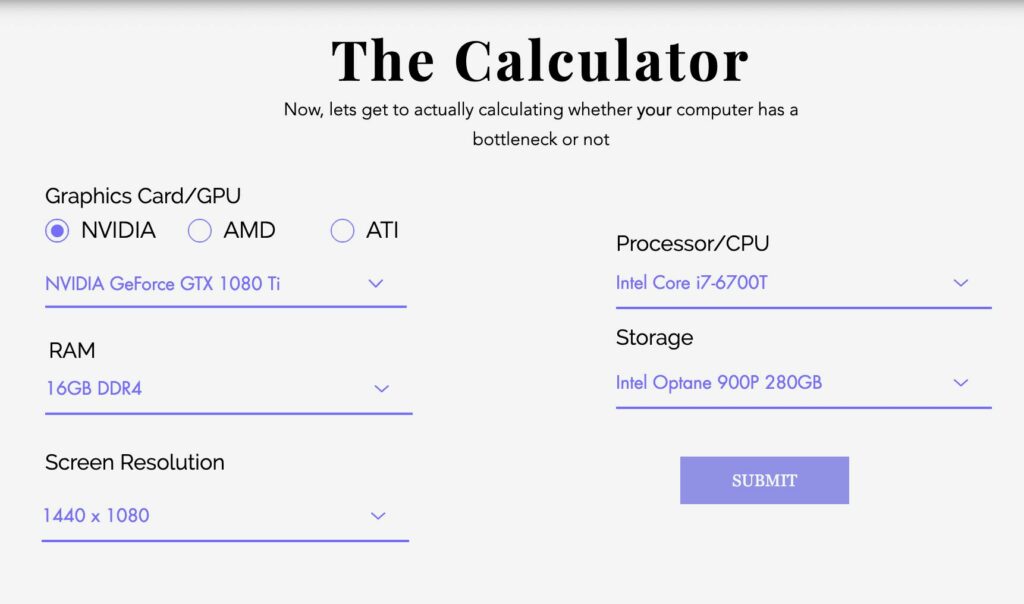
CPU Bottleneck Calculator Results:
A CPU bottleneck calculator helps determine if your computer’s CPU limits performance, especially in gaming or heavy applications.
Here Is How To Interpret The Results:
- Bottleneck Percentage: Indicates how much the CPU restricts the GPU’s potential. Higher percentages suggest the CPU may be too weak for the GPU.
- Symptoms: You might experience lower frame rates, stuttering, or slower overall performance.
- Action: If the bottleneck percentage is high (e.g., over 15-20%), consider upgrading your CPU to better match your GPU’s capabilities.
GPU Bottleneck Calculator Results:
A GPU bottleneck calculator assesses whether your GPU is holding back your system’s performance, particularly in graphical tasks.
Here Is What The Results Typically Indicate:
- Bottleneck Percentage: Shows how much the GPU is restricting the CPU’s performance. Higher percentages suggest the GPU may be too powerful for the CPU.
- Symptoms: You might notice the CPU usage is low while the GPU is maxed out, indicating the CPU is waiting on the GPU to finish tasks.
- Action: If the bottleneck percentage is significant, consider upgrading your CPU to complement your GPU better, ensuring a balanced system for smoother performance.
Expert Tips For Avoiding Bottlenecks – Optimize Your Processes!

Choosing The Right Components:
- Balance Is Key: Ensure your CPU and GPU are well-matched in performance.
- Future-Proofing: Opt for components that can handle future software demands.
System Maintenance:
- Regular Updates: Keep drivers and software updated.
- Cooling Solutions: Invest in proper cooling to maintain optimal performance.
Read Also: GPU Junction Temperature
CPU Vs. GPU Bottlenecks – Comparison Table!
| Feature | CPU Bottleneck | GPU Bottleneck |
| Cause | CPU cannot keep up with GPU’s demands | GPU cannot render frames as fast as the CPU |
| Symptoms | Low frame rates, stuttering | High CPU usage, low GPU usage |
| Solutions | Upgrade CPU, optimize settings | Upgrade GPU, adjust graphics settings |
| Impact | It affects overall system performance | Primarily affects visual performance |
Frequently Asked Questions:
1. Why You Should Never Use PC Bottleneck Calculators?
PC bottleneck calculators can be unreliable because they oversimplify a complex issue. They do not account for all factors affecting computer performance. Understanding your computer’s parts and how they work together is more reliable than relying solely on these calculators.
2. Is The Bottleneck Calculator From PC Builds Reliable For Older CPUs?
Yes, A bottleneck calculator can be useful for older CPUs. It helps you see if your CPU might limit performance with a new graphics card. But remember, it is only sometimes exact because game performance can vary. Consider other factors like RAM and motherboard compatibility for a complete picture of your PC’s potential.
3. How Do You Calculate CPU Bottlenecking?
- Monitor CPU Usage: Check how much your CPU works when doing intensive tasks like gaming or editing.
- Look For High CPU Usage: If the CPU usage is near 100% and other parts like the GPU are less active, your CPU could be the bottleneck.
- Consider Upgrading: Upgrading your CPU or balancing your system’s components can reduce bottlenecking and improve overall performance.
4. How Bottleneck Calculators Help You Build A Better PC?
Bottleneck calculators are tools that help you make sure all the parts of your new PC work well together. They check if one part is much slower than another. For example, if your graphics card is super fast but your processor is slow, the processor might hold back the graphics card. The calculator helps find the right balance, so your PC runs smoothly and all parts work together efficiently.
5. Is 100% CPU Usage A Bottleneck?
Not every time. When your computer uses a lot of CPU, it might mean there is a problem, but it is not always a big issue. For example, if your CPU is always at 100% while playing games and your GPU is much lower, like below 50%, it probably means there is a problem slowing things down.
6. Does Bottleneck Damage GPU?
No, A bottleneck by itself would not harm your GPU. It just means each part of your computer works at its maximum capacity. But if the bottleneck makes your CPU work too hard and get too hot, that could slowly damage parts of your computer.
7. What is a good CPU GPU bottleneck?
A good CPU-GPU balance ensures neither component bottlenecks the other. A bottleneck occurs when one part (usually the CPU or GPU) limits the performance of the other.
8. does a bad cpu bottleneck the gpu
Yes, if the CPU is weak or outdated, it can bottleneck a powerful GPU, limiting its performance.
9. is my cpu bottlenecking my gpu
You can check by monitoring CPU and GPU usage during gaming. If the CPU is at 100% while the GPU is underutilized, the CPU is likely bottlenecking.
10. will my processor bottleneck my gpu
It depends on the CPU-GPU pairing. A low-end CPU with a high-end GPU will likely cause a bottleneck.
11. what does bottleneck mean pc?
In a PC, a “bottleneck” refers to a component (such as a CPU or GPU) that limits the overall system performance because it cannot keep up with the performance of other components. This causes a slowdown in tasks, as the faster components are forced to wait for the slower one to catch up.
Conclusion:
In Conclusion, Understanding CPU and GPU bottlenecks is crucial for getting the best performance from your computer. A bottleneck happens when one component, like the CPU or GPU, slows down the other, limiting overall performance. Using a bottleneck calculator can help you figure out if your CPU or GPU is holding back your system.
By balancing these components, you can optimize your computer’s performance for smoother and faster operation.
Read Also:
What Is Normal GPU Usage While Gaming?
Is Fortnite GPU Or CPU Intensive?
How To Undervolt GPU?


